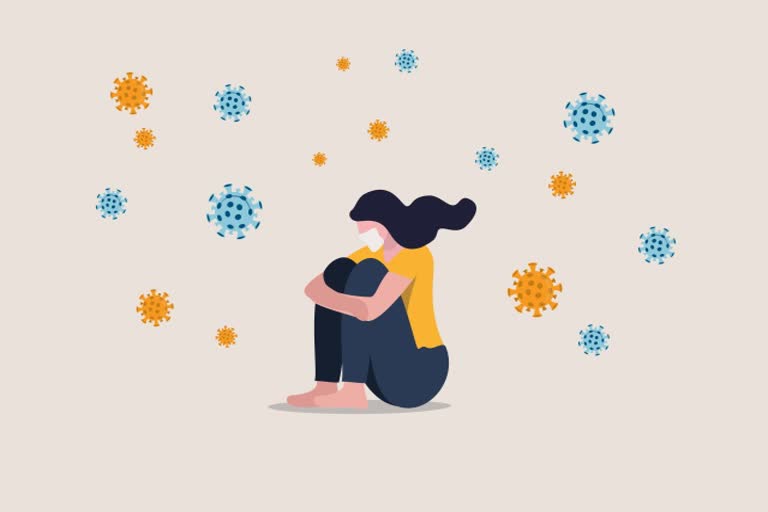35-year-old Kavita Shivhare, who lives in a society in Indore, has been suffering from severe anxiety disorder for quite some time now. According to Kavita, due to the increasing incidents of casualties amidst the second wave of COVID-19, she has developed a fear of uncertainty pertaining to her life. The situation is so serious that even if she comes across the news of someone getting sick in general or of someone’s demise due to natural causes, it makes her feel very restless and anxious.
Similar is the situation of Rajesh Aggarwal, who lives in Dehradun. 45 years old Rajesh says that he feels very tense after hearing the news of the death of people of all ages around him. There is a strange fear and anxiety which has developed listening to and reading about the messages on the demise of their loved ones, on social networking sites. The situation is such that he is even afraid to surf through social networking sites or pick up calls, fearing whose loss he may have to hear.
These are just two cases, but there are many people like Kavita and Rajesh in our country who are going through the same feeling of fear and anxiety in the current times. The second wave of COVID-19 in India has heavily affected the mental health of everyone. What is more concerning is that not just people who have suffered COVID-19 severity, loss of a family member or a close one, but others who are not even related to them in any way have been affected.
To know more about how the contemporary situations have created a negative impact on people and given rise to mental problems, the ETV Bharat Sukhibhava team spoke to Dr. Veena Krishnan, senior Psychologist, based in Dehradun.
Future Uncertainty Is Creating Problems
Dr. Krishnan says that nowadays most of the people who come to her for advice and treatment suffer from many mental problems including fear, uncertainty, sadness, anxiety, and stress due to some or other reason. It is true that the incidents of large numbers of casualties due to the second wave of coronavirus have left a deep impact on the minds of the people. A large number of people are worried that even their time on earth is uncertain.
At the same time, people who have lost a family member, a loved one, or a friend, besides sadness and anxiety, are also feeling guilty for not being able to help their loved ones in these difficult times and saving their lives. Moreover, if the person who passed away was young, we can see that the impact of his/her death is greater on their friends and relatives.
Also Read: How COVID Gave Rise To Depression, Aggression Within Families
5 Stages Of A Grief
Elizabeth Kubler Ross mentioned the five stages of grief in 1969 in her book "On the Death and Dying". Doctor Krishnan explains that in the present circumstances, a large number of people are experiencing these five stages of grief, which are:
- Denial
In this stage, people try to deny or not accept the fact that the incident has happened. The information a person has received is a lot to process, perhaps overwhelming. Therefore, he/she may find themselves in a state of delusion, avoidance of the situation, and shock. - Anger
In the second stage, a person may have restlessness, irritability, frustration, and disappointment. There is so much information to process that anger may seem the easiest way to vent your feelings. - Bargaining
To avoid pain, sorrow, and suffering a person in this stage may wish for it to end and ask God to change the outcome. They may ask God to trade themselves for the other person, ask for them to heal or come back, to have made them suffer instead of their loved one, etc. The person may accept the fact but make every possible effort to escape reality. - Depression
Here, a person may feel anxious, helpless and begin to feel the absence of the person even more. The person enters reality and may wish to isolate and socialize less. - Acceptance
In this final stage, the person at some level tries to settle down with the circumstances and tries to accept them. Although it does not mean that the pain or sorrow one is going through has lessened, but the acceptance of truth helps them move on in life.
How To Face The Situation?
Dr. Krishnan explains that people generally believe that with time, the pain and sorrow fade away. But in reality, it's the activities and the work that keeps him/her away from the grief. Therefore, it is very important that if a person begins to experience such feelings of grief, ask them to indulge in some activities, even if it is for a while, to distract them from the feeling of sadness. Keep in touch with the person and cooperate with them.
Usually in our country in such circumstances, people do not seek professional help and do not even share their feelings with anyone. In this case, it is very important for their family and friends to stay in constant touch with them and communicate with them regularly. If the situation is complicated due to the death of a loved one, friends and relatives can share their memories with the deceased person, to make the grieving person accept the truth.
Dr. Krishnan says that in view of the current situation, where there is not just physical but mental suffering as well, it is very important that ‘Grieving Clinics’ become operational at the government and administrative level. This will help people to acquire grief therapy and medical assistance to manage to deal with their situation. Also, on a personal level, people must have a list of at least 10 people to who they can reach out for help. Do not hesitate to seek professional help if required.



